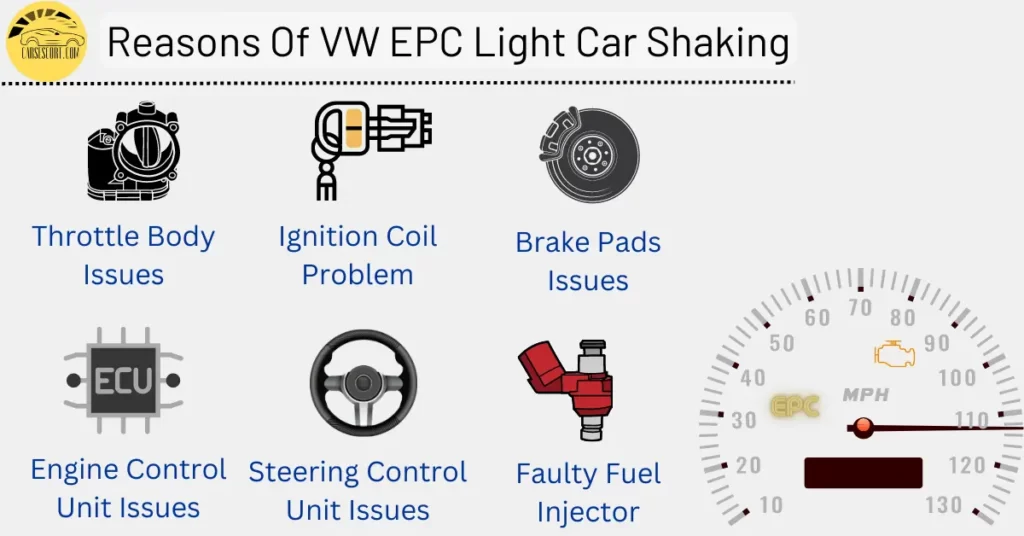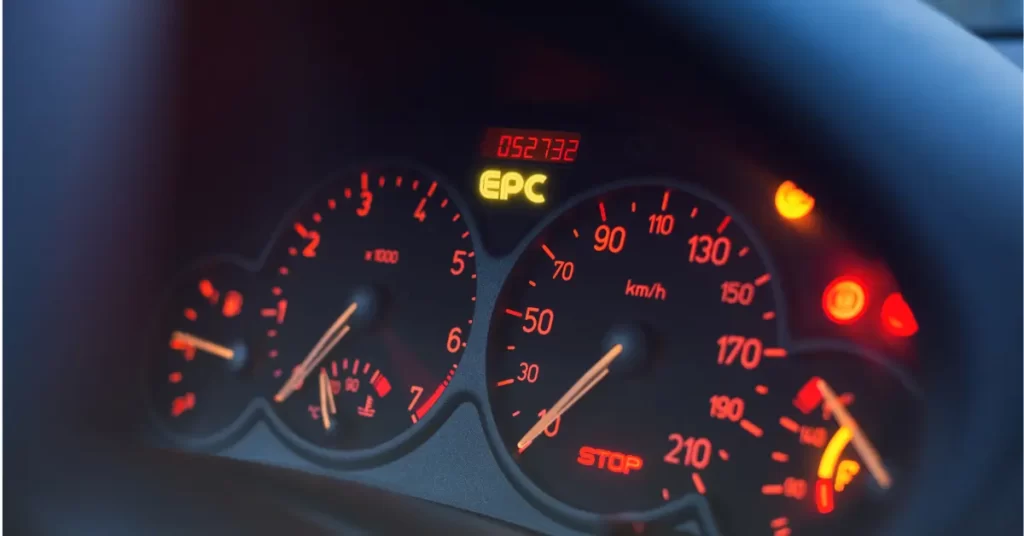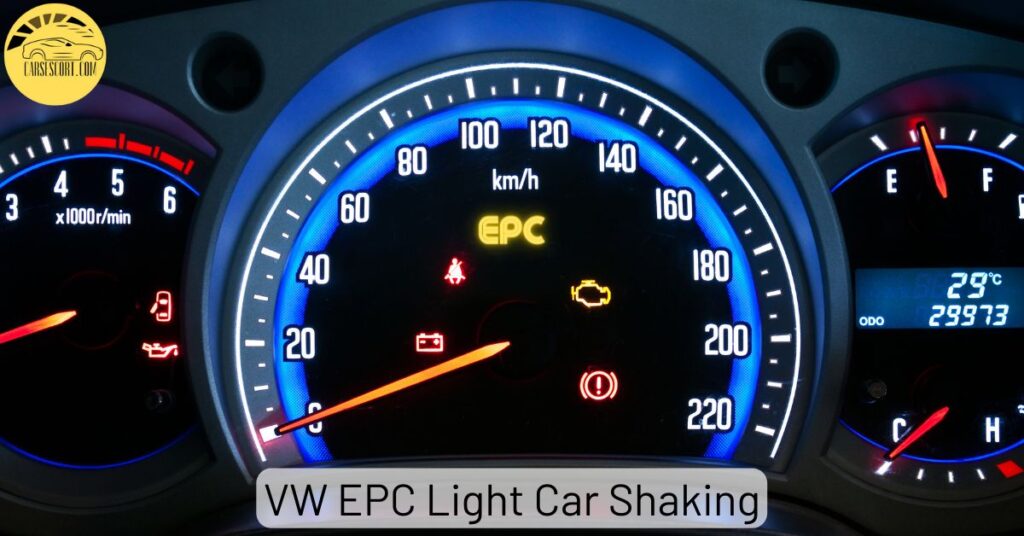The EPC stands for Electronic Power Control, and when it comes on, it means there is a problem with the engine management system. You may have experienced the anoying EPC light and car shaking if you are a Volkswagen owner. The issue can be concerning and frustrating, especially if you rely on your car for daily transportation.
Our research concluded that in 85% of cases, the VW EPC light car shaking issue occurs due to Volkswagen throttle body problems. However, other issues include ignition coil problems, malfunctioning brake pads and faulty fuel injectors.
If the EPC warning turns on, it’s crucial to have the vehicle inspected by a professional mechanic who can detect the cause of the issue and replace any malfunctioning ignition components. Ignoring such problems can cause further engine damage and reduce fuel efficiency.
What Does The VW EPC Light Mean?
The Volkswagen (VW EPC light) is a warning signal that can indicate a range of issues with your vehicle’s throttle system, including problems with the throttle pedal, throttle body, traction control, or cruise control unit.
Volkswagen EPC light car can also be triggered on your dashboard along with car shaking due to malfunctioning the brake control, steering, and engine control units.
Because the Electronic Power Control system of the Volkswagen closely connects with this system of your car.
VW EPC Light Car Shaking: Main Reasons

There could be various reasons why a Volkswagen (VW) car might experience shaking and display the EPC (Electronic Power Control) light.
Following are the possible reasons for this issue:
1) Volkswagen Throttle Body System Issues
Volkswagen’s throttle system is a crucial engine component, controlling the airflow and fuel delivery to ensure smooth and efficient performance. However, a problem with the throttle system can cause the EPC warning lights on your car dashboard to turn on and lead to shaking and a rough ride.

A malfunctioning throttle body unable to controls the amount of air entering the engine and can cause restricted airflow, resulting in engine misfires and vibrations while driving.
In that case, it can send incorrect signals to the engine control unit, resulting in wrong fuel delivery and causing engine misfires and poor performance.
Moreover, wiring issues such as loose connections, shorts, or corrosion can disrupt the communication between the throttle system components, leading to poor engine performance and triggering the rear light.
2) Ignition Coil Problem
The ignition coil is an essential component of the engine’s ignition system, which supplies power to the spark plugs, allowing them to ignite the fuel mixture in the combustion chamber.

Faulty ignition coil can cause a lack of or inadequate spark, leading to engine misfires, vibrations, and VW EPC light car shaking.
A malfunctioning ignition coil can be caused by several factors, including excessive heat, electrical or wiring issues, or mechanical wear and tear.
If the coil is exposed to high temperatures due to a faulty cooling system, it can become damaged, leading to misfires and engine shaking.
Similarly, wiring issues such as corrosion or damage can prevent the coil from receiving the proper voltage, causing engine misfires.
3) Malfunctioning Brake Pads
The brake system is a crucial safety feature of any vehicle, responsible for slowing or stopping the car when needed.

If the brake pads become worn out or damaged, it can cause vibrations, shaking, and the EPC, brake light to turn on.
Worn or damaged brake pads can occur due to several factors, including normal wear and tear, driving habits, or a malfunctioning brake system.
If the brake calipers are sticking or the brake fluid is contaminated or low, it can cause uneven wear on the brake pads, leading to vibrations while driving.
If the brake pads become glazed due to excessive heat or prolonged heavy braking, it can reduce their effectiveness, leading to shaking, vibrations and EPC Warning lights may come on.
4) Faulty Fuel Injector
The fuel injectors are an integral part of the engine’s fuel system, which delivers fuel to the engine’s combustion chamber. If the fuel injectors become faulty, it can cause several issues, including engine misfires, vibrations, and a rough ride.

A clogged or malfunctioning fuel injector can occur due to several factors, including poor fuel quality, debris buildup, or mechanical failure.
If the fuel filter is clogged or the fuel pressure is low, it can cause the fuel injectors to become clogged, leading to poor engine performance and misfires.
When the fuel injectors become worn out or develop mechanical issues, such as a broken spring or a faulty seal. In that case, it can cause fuel leaks, leading to poor engine performance and car sacking with EPC warning.
Read This Guide Too: Does Marvel Mystery Oil Clean Fuel Injectors?
5) Malfunctioning Engine Control Unit (ECU)

The Engine Control Unit (ECU) controls various Volkswagen engine functions, such as fuel delivery, ignition timing, and emissions control. If the ECU becomes faulty, it can cause the engine to run poorly, leading to shaking, vibrations, and the EPC turning on.
ECU issues can occur due to various factors, including electrical faults, Engine Mount Damage, software glitches, or mechanical failure.
If the ECU’s electrical connections become corroded or damaged, it can cause communication issues between the ECU and other engine components, leading to VW EPC light Car Shaking, poor engine performance and several codes appears on dashboard include check engine light and EPC warning lights.
6) Malfunctioning Steering Control Unit
The Steering Control Unit (SCU) is a critical component of the vehicle’s steering system, responsible for assisting the driver in steering the car.

If the SCU becomes faulty, it can cause the steering to become unresponsive, erratic, or stiff, leading to shaking, vibrations while driving and error code may appears.
SCU issues can occur due to various factors, including electrical faults, mechanical failures, or sensor malfunctions.
If the SCU’s electrical connections become corroded or damaged, it can cause communication issues between the SCU and other steering components, leading to poor steering performance and shaking.
What to do when the EPC light comes on?
When the EPC warning light appears on your dashboard, seek professional mechanical help or your car dealership. EPC light car shaking requires the attention of a qualified automotive expert to properly address the problem.
Don’t take chances with your safety and the health of your vehicle; seek professional help as soon as possible.
How Do I Fix EPC Warning Light?
Check the throttle body for any damage or malfunctioning.
The throttle body is essential to the engine’s air intake system. If your vehicle’s throttle body is dirty or malfunctioning, it can restrict the airflow, causing a decrease in engine performance and triggering the EPC warning light.
Inspect the throttle body for signs of damage or wear and clean it if necessary. If cleaning does not solve the issue, you may need to replace the throttle body.
Inspect the ignition coil for signs of damage or wear.
When the ignition coil is malfunctioning, it can cause misfires and loss of power and trigger the EPC warning light. Check the ignition coil for signs of damage or wear, such as cracks or corrosion.
Using a multimeter to test the coil’s resistance and compare it to the manufacturer’s specifications is good. Replace the ignition coil if the resistance is outside the acceptable range.
Also, check the spark plugs and wires, which work with the ignition coil, to ensure proper engine performance.
Diagnose with a scanner tool to identify problems triggering the EPC warning light.
A diagnostic scanner tool is an electronic device that communicates with the car’s onboard computer system. It can retrieve information from the car’s sensors and control modules and identify any problems triggering the EPC warning light.
The scanner tool can read error codes and display them on a screen, providing the mechanic or car owner with valuable information about the cause of the problem. Once the issue is identified, the scanner tool can reset the EPC warning light after the repairs.
Inspect the engine control unit and steering control unit.
The engine control unit (ECU) and steering control unit (SCU) are two essential components that regulate various functions of the car. If either of these units malfunctions, it can cause engine performance or steering issues, triggering the EPC warning light.
Check the ECU and SCU for any signs of damage or wear, such as corrosion or loose connections.
Take the car to a certified mechanic.
You must take the car to a certified mechanic if you cannot identify and fix the problem causing the EPC warning light. They have the knowledge, expertise, and specialized tools to correctly diagnose and repair the issue.
The mechanic will begin by performing a thorough inspection of the car, including a diagnostic scan, to identify the root cause of the problem. Once the problem has been identified, they will provide a detailed explanation and a recommended course of action to fix it.
This may involve replacing parts, making adjustments, or performing other repairs. A skilled mechanic will ensure that all repairs are completed correctly.
You May Also Like To Read:
VW EPC Light and Loss of Power
A faulty ignition system, such as malfunctioning spark plugs or ignition coils, can cause the engine to misfire, leading to power loss and shaking.
A loss of power, which may accompany the illumination of the EPC warning, can be caused when the engine’s fuel and air mixture does not ignite properly.
Other issues include a malfunctioning turbocharger, a clogged fuel filter, or a problem with the fuel pump.
The EPC light and loss of power problem is not limited to the Volkswagen brand alone, it can occur in any vehicle that utilizes an EPC system.
VW EPC Light Reset
The EPC (Electronic Power Control) light in a VW (Volkswagen) typically indicates a problem with the engine or the throttle system. To reset the EPC light, you should follow these steps:
- Turn off your car engine and remove the key from the ignition.
- Wait for about 30 seconds.
- Turn the key to the “on” position without starting the engine.
- Press the accelerator pedal and hold it there for at least 10 seconds.
- Release the pedal and turn the key back to the “off” position.
- Wait for about 30 seconds.
- Start the engine and check if the EPC light has been reset.

Volkswagen EPC Recall
In 2021, Volkswagen issued a recall for certain models’ cars due to a potential issue with the EPC system. The recall affects specific model years of the Volkswagen Jetta, Golf, and Tiguan vehicles equipped with a 1.4-liter engine.
According to the recall notice, the EPC system in these vehicles may experience a failure, which can cause the engine to stall and result in a loss of power. This issue poses a safety risk for drivers and passengers, as a sudden loss of power can lead to a crash.
If you own affected Volkswagen vehicle, bring it to an authorized dealer to have the EPC system inspected and repaired if necessary.
The repairs will be made free of charge, and owners can check the Volkswagen website or contact their local dealership to find out if their vehicle is included in the recall.
FAQ
How much will it cost to fix the EPC light on VW?
The cost to fix the EPC light on a VW can vary depending on the cause of the issue. If the problem is minor, such as a faulty sensor, the cost to fix the EPC light may be relatively low, typically ranging from $100 to $300.
However, if there is damage to the throttle body, other essential components or transmission issues, the cost to fix the warning can be much higher, ranging from $500 to $1500 or more.
Can I drive a Shaking Volkswagen Car With an EPC Light On?
Driving a shaking Volkswagen car with an EPC light on is not recommended, as it could indicate a serious problem with the engine or throttle system.
The warning light typically indicates an issue with the electronic control system that manages the engine’s performance.
With this warning light on, continuing to drive the vehicle can cause further damage and potentially put the driver and passengers at risk.
How serious is EPC light?
The seriousness of the EPC light depends on the specific cause of the issue. Sometimes, the light may come on due to a minor issue, such as a faulty sensor, which can be fixed quickly and easily.
However, in other cases, the light could indicate a more serious problem, such as throttle body damage or transmission system malfunctioning, requiring immediate attention from a qualified mechanic.
Can bad gas cause EPC light?
Bad gas can cause the EPC light to come on, especially if it contains contaminants or has a low octane rating. In such cases, the engine may misfire or experience a loss of power, which could trigger the EPC light.
However, it’s important to note that bad gas is not the only cause of the EPC light, and it’s essential to have the vehicle diagnosed by a mechanic to determine the underlying cause of the issue.
Affiliate Disclosure: Cars Escort is a participant in the Amazon Services LLC Associates Program. As an Amazon Associate, we earn from qualifying purchases made through affiliate links on our site. Read Our Disclaimer .

